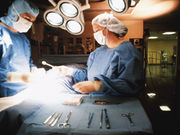Risk of reoperation was lowest for patients of very high-volume surgeons
WEDNESDAY, June 15, 2016 (HealthDay News) — For women undergoing mesh-based prolapse surgery, the reoperation rate is 4.0 percent at a median of 1.17 years, with reduced risk for patients of surgeons with very high volume, according to a study published in the July issue of Obstetrics and Gynecology.
Erin C. Kelly, M.D., from the University of Western Ontario in London, Canada, and colleagues conducted a retrospective, population-based cohort study involving all women who underwent mesh-based prolapse procedures between 2002 and 2013. The authors examined the proportion of women who underwent surgical revision of the mesh, with the primary exposure of surgeon volume. Data were included for 5,488 women who underwent mesh implantation by one of 368 unique surgeons; median follow-up was 5.4 years.
The researchers found that at a median of 1.17 years after implantation, 4.0 percent of women underwent mesh reoperation. Patients of very high-volume surgeons had a lower risk of reoperation for complications (3.0 versus 4.8 percent; adjusted hazard ratio, 0.59). Younger age, concomitant hysterectomy, blood transfusion, and increased medical comorbidity correlated with vaginal mesh reoperation in multivariable modeling.
“Approximately 5 percent of women who underwent mesh-based prolapse surgery required reoperation for a mesh complication within 10 years,” the authors write. “The risk of reoperation was lowest for surgeons performing 14 or more procedures per year.”
One author disclosed financial ties to Astellas Canada.
Full Text (subscription or payment may be required)
Copyright © 2016 HealthDay. All rights reserved.








